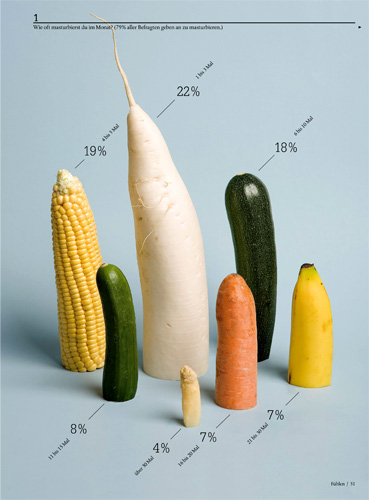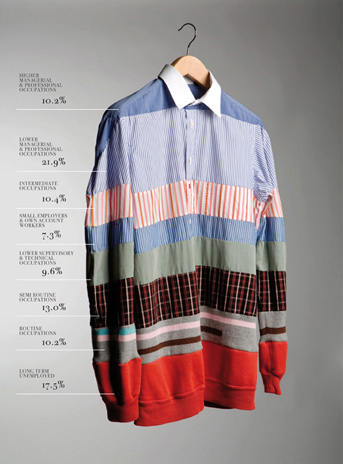BA (Hons.) GRAPHIC DESIGN
|
Level
|
6
|
Module Code:
|
Module Title:
|
Learning Outcomes:
|
BRIEF TITLE: INFORMATIVE WASTE
|
Brief:
To create a series of photographic infographics that communicate key facts about material production and material waste. By photographing objects, a visual link is created to the data heavy statistics on material consumption and waste.
|
Background:
There are a variety of sources of information available on this subject, however the majority are in the form of dense governmental spreadsheets and reports by NGOs. There is a limited access for ordinary people to come into contact with this information, particularly if they are not looking for it (and sometimes even if they are).
|
Considerations:
Many of these statistics are not very interesting by nature. In conjunction with one another however they become interesting. Allow a narrative to flow through each image.
|
Mandatory Requirements:
A set of at least 5 images which communicate key facts about that chosen material.
Website proposals. |
Target Audience:
Educated professionals with little or no knowledge of subject matter, between the ages of 25 and 45.
|
Tone of Voice:
Clear, approachable and scientific. Ensure that tone is lighthearted enough not to diminish interest.
|
Deliverables:
5 Images ready for web application.
Website proposals. Mock ups, plans, research, idea development. |
http://www.plasticsrecyclingexpo.com/plasticsrecycling2014/statisticssomething like this?
https://www.gov.uk/government/uploads/system/uploads/attachment_data/file/416471/UK_Statistical_release_UPDATEv6_19_03_2015.pdfComputer Waste - use chips etc.
- avg. lifespan
- material makeup
- time taken to decompose
- avg. distance travelled
- % recycled
- % landfill
Styrofoam Vs. Plastic - use cups
- toxicity
- cost
- recyclability
- avg. use time
Paints - spread paint around
- toxicity
- by colour
- harmful attributes
- avg. distance travelled
MDF - use circles
- recyclability
- energy used to make (m2)
- cost to make (m2)
- decomposing time?
Cardboard - use boxes
- price (m2)
- trees (m2)
- how much is recycled (% or tonnes UK)
Milk cartons
Paper (pre use) - folded
- % recycled
- % FSC certified
- % unsustainable
- avg. distance transported
paper (post use) - crunched up
- % that gets recycled (or tonnes)
- % landfilled (or tonnes)
(same as paper for wood?)
Rubber - tubes
- avg. transportation
- avg. cost/kg
- deforestation stats
use CDs for pie chart(s) about tech stats?
Vacuform -
- energy used to make
- decomposing time
- % used in UK packaging
general UK packaging - metal, glass, plastic, styrofoam, cardboard
- % of total of each material use
- % of each material used which is recycled
Do matches?
------
use percentages comparisons between producing from virgin and producing from recycled?
Definite objects so far:
(stats uk only)
Paper
before:
£5,565,000,000 of paper/paperboard imported 2012 - p47 of http://www.ons.gov.uk/ons/dcp171778_300994.pdf
energy for manufacturing 1 tonne office paper requires 37.01 million Btu for virgin and 20.12 million Btu for recycled - p26/28 of http://www.epa.gov/climatechange/wycd/waste/downloads/chapter2.pdf
therefore 83.9% more energy used for virgin
paper production breakdown (into percentages) and total tonnage - p10 of http://www.forestry.gov.uk/pdf/ukwpt13.pdf/$FILE/ukwpt13.pdf
recycled newspaper production 0.34 mtce, virgin 0.58 mtce per tonne (from epa - link above)
therefore
12.5 million tones paper used annually uk
v
after:
recycling 1 tonne paper saves 1.32 tonnes carbon equivalent- p2 of http://www.paper.org.uk/information/factsheets/greenhouse_gas.pdf
520,000 tonnes paper went to landfill in 2012 uk - https://www.gov.uk/government/uploads/system/uploads/attachment_data/file/416471/UK_Statistical_release_UPDATEv6_19_03_2015.pdf
paper packaging accounted for 36% of all UK waste 2012 p23 of https://www.gov.uk/government/uploads/system/uploads/attachment_data/file/422618/Digest_of_waste_England_-_finalv2.pdf
It takes 7 days for a recycled newspaper to come back as a newspaper again. (recyclenow)
plastic bottle (PET) :
before:
£7,089,000,000 of plastic imported to uk 2012 - p47 of http://www.ons.gov.uk/ons/dcp171778_300994.pdf
manufacturing 1 tonne virgin PET produces 0.59 MTCE (metric tonnes carbon equivalent) - p24 of http://www.epa.gov/climatechange/wycd/waste/downloads/chapter2.pdf
manufacturing 1 tonne recycled PET produces 0.05 MTCE (metric tonnes carbon equivalent) - p24 of http://www.epa.gov/climatechange/wycd/waste/downloads/chapter2.pdf
energy for manufacturing 1 tonne PET requires 32.82 million Btu for virgin and 4.17 million Btu for recycled - p26/28 of http://www.epa.gov/climatechange/wycd/waste/downloads/chapter2.pdf
recycled pet produces 8.5% of carbon equivalent emissions produced by virgin production
virgin pet uses 586% more energy
global plastic production grew from 204 to 299 million tonnes between 2002 and 2013
http://issuu.com/plasticseuropeebook/docs/final_plastics_the_facts_2014_19122
after:
1,910,000 tonnes plastic packaging go to landfill (74.8% of total (2,554,000)) - p14 https://www.gov.uk/government/uploads/system/uploads/attachment_data/file/416471/UK_Statistical_release_UPDATEv6_19_03_2015.pdf
estimated that uk households use 500 plastic bottles per year
plastic remains for x years
cup (styro or plastic?) - apparently plastic cups usually code 7
before- £7,089,000,000 of plastic imported to uk 2012 - p47 of http://www.ons.gov.uk/ons/dcp171778_300994.pdf
after- 1,910,000 tonnes plastic packaging go to landfill (74.8% of total (2,554)) - p14 https://www.gov.uk/government/uploads/system/uploads/attachment_data/file/416471/UK_Statistical_release_UPDATEv6_19_03_2015.pdf
can (aluminium)
before:
manufacturing 1 tonne virgin aluminium produces 3.53 MTCE (metric tonnes carbon equivalent) - p24 of http://www.epa.gov/climatechange/wycd/waste/downloads/chapter2.pdf
manufacturing 1 tonne recycled aluminium produces 0.28 MTCE (metric tonnes carbon equivalent) - p24 of http://www.epa.gov/climatechange/wycd/waste/downloads/chapter2.pdf
energy for manufacturing 1 tonne aluminium requires 213.33 million Btu for virgin and 16.59 million Btu for recycled - p26/28 of http://www.epa.gov/climatechange/wycd/waste/downloads/chapter2.pdf
3.53/0.28 = 12.6
or 1261%
3.53-0.28 = 3.25
therefore 1161% more
16.59 as percentage of 213.33 = 7.8%
around 75% of all aluminium ever made is still in circulation - recyclenow.com
after-
100,000 tonnes aluminium packaging goes to landfill each year (61.5% of total (162,000)) - p14 https://www.gov.uk/government/uploads/system/uploads/attachment_data/file/416471/UK_Statistical_release_UPDATEv6_19_03_2015.pdf
aluminium can be recycled over and over with no loss of quality - http://www.aluminum.org/industries/production/recycling
glass bottle -
before:
2,173,803 tonnes container glass produced 2012 (estimate) - p85 http://www.wrap.org.uk/sites/files/wrap/GlassFlow%20Final%20Report.pdf
cost per tonne virgin green glass - £104.32 vs. cost per tonne recycled green glass - £83-£70 - p54 of http://www.wrap.org.uk/sites/files/wrap/GlassFlow%20Final%20Report.pdf
cost per tonne clear recycled - £86, whereas virgin is £106
2173805 x 106 = 230,423,330
2173805 x 86 = 186,947,230
former minus latter = £43,476,100 potential savings
manufacturing 1 tonne virgin glass produces 0.13 MTCE (metric tonnes carbon equivalent) - p24 of http://www.epa.gov/climatechange/wycd/waste/downloads/chapter2.pdf
manufacturing 1 tonne recycled glass produces 0.09 MTCE (metric tonnes carbon equivalent) - p24 of http://www.epa.gov/climatechange/wycd/waste/downloads/chapter2.pdf
after:
763,713 tonnes glass sent for remelt in 2012 -p34 of http://www.wrap.org.uk/sites/files/wrap/GlassFlow%20Final%20Report.pdf
870,000 tonnes glass sent landfill 2012 - p39 of http://www.wrap.org.uk/sites/files/wrap/GlassFlow%20Final%20Report.pdf NEEDS TO BE CHECKED
food (could do unused, avoidable and unavoidable?)-
before:
avg. uk household spends £56.8 on food and non-alcoholic drinks - http://www.theguardian.com/news/datablog/2013/dec/11/families-spend-489-each-week-on-what
after:
p8-9 of http://www.wrap.org.uk/sites/files/wrap/UK%20Estimates%20February%2015%20%28FINAL%29.pdf
food waste accounts for 16.8% (3.9 million tonnes) of all local authority collected waste 2010/11 - p34 of https://www.gov.uk/government/uploads/system/uploads/attachment_data/file/401400/Digest_of_waste_England_2015_-_final.pdf
food waste pie chart (use pie) -
do either food waste by sector or food waste by type of food use p38/p40 of https://www.gov.uk/government/uploads/system/uploads/attachment_data/file/422618/Digest_of_waste_England_-_finalv2.pdf
p38 -
(million tonnes)
household - 7
manufacturing - 3.92
hospitality 0.92
other - 3
retail wholesale - 0.45
15.29 total
so if 15.29 is 360
(360/15.29 = 23.54)
multiply each by above for degrees
household - 164.8
manufacturing - 92.3
hospitality- 21.7
other - 70.62
retail wholesale -10.6
TEST : 360.02 success
cumulative degrees :
not needed
clothes-
before:
3.25 million tonnes clothing flow through uk each year (= roughly 55 kg per person) - p2 of http://www.ifm.eng.cam.ac.uk/uploads/Resources/Other_Reports/UK_textiles.pdf
avg. uk household spends £23.4 on clothing and footwear - http://www.theguardian.com/news/datablog/2013/dec/11/families-spend-489-each-week-on-what
£14 trillion clothing imported 2012
after:
38% clothes waste incinerated (7%) or went to landfill (31%) 2011 - p37 of https://www.gov.uk/government/uploads/system/uploads/attachment_data/file/401400/Digest_of_waste_England_2015_-_final.pdf
14% clothes waste recycled - p37 of https://www.gov.uk/government/uploads/system/uploads/attachment_data/file/401400/Digest_of_waste_England_2015_-_final.pdf
48% clothes waste reused (14% overseas / 34% UK) - p37 of https://www.gov.uk/government/uploads/system/uploads/attachment_data/file/401400/Digest_of_waste_England_2015_-_final.pdf
wood pie chart-
use statistics on what recycled wood is used for and make pie chart accordingly :
p18 of https://www.gov.uk/government/uploads/system/uploads/attachment_data/file/82571/consult-wood-waste-researchreview-20120731.pdf (could title 'Where does it go?')
(numbers below in kilotons)
Panel board 1,119
Bedding 500
Equine 75
Mulches 150
Pathways 17
Biomass Energy 551
Informal Commercial 100
Informal Domestic 150
Exports 540
Total 3,202 (divide by 360 = 8.894)
therefore 1 degree = 8.894
so divide above tonnage by 8.894 to get angle...
pie chart angles:
Panel board 125.8
Bedding 56.2
Equine 8.4
Mulches 16.9
Pathways 1.9
Biomass Energy 62
Informal Commercial 11.2
Informal Domestic 16.9
Exports 60.7
Total 360
wood waste arising from sectors:
p8 of https://www.gov.uk/government/uploads/system/uploads/attachment_data/file/82571/consult-wood-waste-researchreview-20120731.pdf
Construction 1.2 - 93.9
Demolition/Remodelling 1.1 - 86.1
Furniture 0.3 - 23.5
Joinery 0.1 - 7.8
Other Industrial 0.1 - 7.8
Municipal 0.6 - 47
Packaging 1.2 - 93.9
Total 4.6 - 360
360 / 4.6 = 78.26
therefore multiply by 78.26
computers -
before:
1,231,078.853 tonnes EEE placed on market in 2014 - from EEE spreadsheet on https://www.gov.uk/government/statistics/waste-electrical-and-electronic-equipment-in-the-uk-2013
1231078.853 + 488188.186 = 1,719,267 tonnes EEE placed on market 2014
manufacture alone of Iphone 5s in 2013 produced 23.6 mil tonnes of emissions.
http://therestartproject.org/consumption/energy-and-our-gadgets/
iphone 5s produces 70kg c02 emissions (81% of which at production)
therefore 56.7kg emissions per iphone 5s production.
UK spent 4.97 billion pounds on electronics in 2013 - http://www.statista.com/statistics/274833/consumer-electronics-ce-revenue-in-the-united-kingdom-uk/
toxic chemicals - http://www.greenpeace.org/international/Global/international/planet-2/report/2007/10/laptopreport2.pdf
after:
Nearly 25% of waste electrical and electronic equipment (WEEE) that’s taken to household waste recycling centres could be re-used, worth around £200m gross a year : http://www.wrap.org.uk/content/facts-and-figures
include facts about illicit recycling in ghana etc. - health issues.
207,222 tonnes of carbon equivalent were saved in 2012 in UK by recycling weee
p 73
landfill decomposition : http://recycling.about.com/od/Resources/fl/How-Long-Does-It-Take-Garbage-to-Decompose.htm
titanium - http://www.bbc.com/future/story/20140105-timeline-of-the-far-future
paper/glass/plastic - look at knowledge is beautiful p20
general household waste recycling stats (household waste is basically everything except commercial waste, explained p5-6) -
https://www.gov.uk/government/uploads/system/uploads/attachment_data/file/375945/Statistics_Notice_Nov_2014_Final__3_.pdf - page 5
defra waste stats:
https://www.gov.uk/government/uploads/system/uploads/attachment_data/file/401400/Digest_of_waste_England_2015_-_final.pdf
p23 - packaging waste by material
composition of biodegradable/recyclable landfill waste - p30
composition of local authority collected waste - p34 (unclear if landfill or recycled or overall)
composition of dry recycling - p36
fate of clothing waste - p37
food waste - p38-41
manufacturing waste in price by sector - p55
gate fees for landfill waste streams (wood) - p63
emissions avoided by waste management (recycling etc.) - p73
general facts about recycling and waste management -
http://www.wasteconnect.co.uk/page.aspx?ID=57abb248-648f-4244-b93e-96baad9134fe
import costs statistics (by month) - https://www.uktradeinfo.com/Statistics/NonEUOverseasTrade/Pages/NonEuOTS.aspx
manufacturing sales uk by division 2012 -
http://www.ons.gov.uk/ons/rel/prodcom/prodcom-provisional-results/2012/sty-prod-2012.html
glass flow 2008 (probably not useful) (pdf download) -
http://www.google.co.uk/url?sa=t&rct=j&q=&esrc=s&source=web&cd=3&ved=0CC0QFjAC&url=http%3A%2F%2Fwww.britglass.org.uk%2Fpublications%2Fdownload%2Fuk-glass-manufacture-a-mass-balance-study-2008&ei=V7oiVab7CYLkUuCegoAG&usg=AFQjCNEGXh1vEyubaDGS1jclrayXMJDLHg&sig2=xaJMIqLhhHQJAkBGkW3nzA&bvm=bv.89947451,d.d24
glass flow (production etc) 2012 (wrap) -
http://www.wrap.org.uk/sites/files/wrap/GlassFlow%20Final%20Report.pdf
aluminium and steel import export production:
https://www.surrey.ac.uk/ces/files/pdf/0304_WP_Biffaward_Steel_Al-Final.pdf
eu production statistics data:
http://ec.europa.eu/eurostat/web/prodcom
textiles facts:
http://www.wrap.org.uk/content/fast-facts-textiles
decomposition time:
http://www.blueseaonline.net/manager/filemanager/files/2798-1The_Green_Space.pdf
http://begreenpackagingstore.com/pages/trash-time-decomposition (WITH SOURCES)
http://www.solcomhouse.com/recycling.htm
different types of plastic:
http://www.qualitylogoproducts.com/lib/different-types-of-plastic.htm
environmental agency data download
http://www.geostore.com/environment-agency/WebStore?xml=environment-agency/xml/ogcDataDownload.xml#:
local environmental data (could look at leeds?)
https://www.gov.uk/check-local-environmental-data
computer waste general stats:
http://www.wasteconnect.co.uk/page.aspx?ID=50a1245d-dec9-47eb-8e52-9534478b6c92
http://www.rwmexhibition.com/files/prof_margaret_bates__university_of_northampton.pdf
carbon savings caused by recycling (by material) - p 73 of https://www.gov.uk/government/uploads/system/uploads/attachment_data/file/422618/Digest_of_waste_England_-_finalv2.pdf
weee information:
http://ban.org/E-waste/technotrashfinalcomp.pdf
other weee info: http://www.360environmental.co.uk/legislation/producer_responsibility/weee_regulations/#exports
global paper and board statistics:
http://www.paper.org.uk/members/statistics/papermaking/eukey/CEPI_KeyStatistics_2013.pdf
packaging waste exported + other
http://npwd.environment-agency.gov.uk/Public/PublicSummaryData.aspx
general wood stats:
http://www.forestry.gov.uk/forestry/infd-9mbhsd
could make into book / calendar / website?
have slogan at bottom?
"some of this isn't as confusing as you think"
"these are the facts, try to understand why"
"these are the facts, what can be done to make the situation better?"
decomposition rates : http://www.cleanhouston.org/living/recycling/decomposition.htm
potential names for web proposal :
material world
some planning:
finished images:
Evaluation:
I am altogether very happy with the outcome of this project. I feel that the infographics communicate the information clearly in an unconventional way, and that this area has huge potential for further investigation.
One main shortfall of the brief was that I didnt have time to create the web proposals as planned. While these will be done for my portfolio following hand-in, it would have been good to have these done to show how the overall experience would work for the user.
The biggest problem with the process I undertook was that the majority of information was very time consuming to gather. While it was necessary to do so in order to gain an understanding of the subject matter, it would have been better to have the information readily available, and focus more on the design side.















